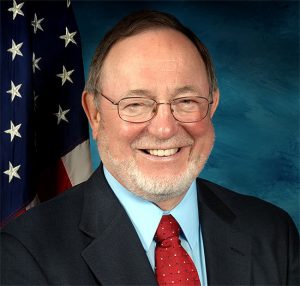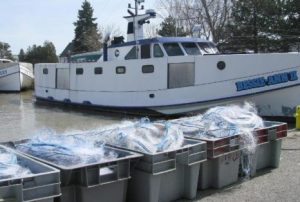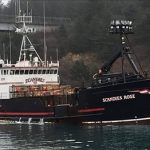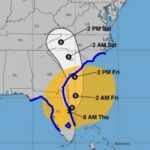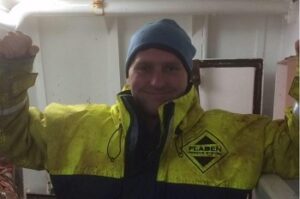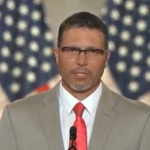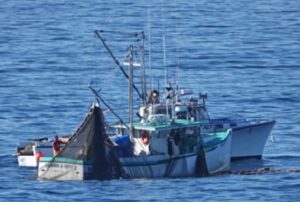Search Results for: Doc Hastings
Tomorrow at 10AM, the House Committee on Natural Resources is marking up 6 bills including legislation by Chairman Doc Hastings to reauthorize the Magnuson-Stevens Act.
 The legislation would renew and amend the Magnuson-Stevens Fishery Conservation and Management Act – which governs the recreational and commercial harvest of fisheries in Federal waters – to implement common sense reforms that will promote increased flexibility and transparency, improve data collection, create jobs, and give predictability and certainty to the coastal communities that depend on stable fishing activities. Watch LIVE! Click here 18:32
The legislation would renew and amend the Magnuson-Stevens Fishery Conservation and Management Act – which governs the recreational and commercial harvest of fisheries in Federal waters – to implement common sense reforms that will promote increased flexibility and transparency, improve data collection, create jobs, and give predictability and certainty to the coastal communities that depend on stable fishing activities. Watch LIVE! Click here 18:32
House Natural Resources Committee Chairman Doc Hastings presses Obama administration for ocean plan docs
Chief Surgeon Doc Hastings (R-Wash.)House Natural Resources Committee and his surgical team has ordered a P.E.T. scan of the National Ocean Policy to understand the workings of the inter-agency National Ocean Council, tasked to implement the Executive Ordered policy. The policy was designed to streamline inter-agency bureaucratic activity related to all thing’s Ocean’s and Great Lakes, including interconnected rivers and tributary’s. In addition to ridicules claim that the Ocean Policy consists of voluntary, non-regulatory guidelines, there is also the issue of not having the foggiest of just how much dough this plan will cost! Read the article @thehill Read the letter to Dr. Kathryn Sullivan, Acting Under Secretary, NOAA
Rep. Doc Hastings’ bill would protect salmon from California sea lions
 Opponents of the bill argued that the Marine Mammal Protection Act already grants local authorities appropriate action to safeguard the local fish species, saying that there was no demonstrative threat that numbers of the salmon population were falling below what was acceptable by the National Oceanic and Atmospheric Administration. Advocates of the bill, including Hastings, argued that the bill was a proactive measure that would build on previous methods which he said have been proven effective. continued@mcclatchy,com
Opponents of the bill argued that the Marine Mammal Protection Act already grants local authorities appropriate action to safeguard the local fish species, saying that there was no demonstrative threat that numbers of the salmon population were falling below what was acceptable by the National Oceanic and Atmospheric Administration. Advocates of the bill, including Hastings, argued that the bill was a proactive measure that would build on previous methods which he said have been proven effective. continued@mcclatchy,com
Powerful House Republican Doc Hastings enters fray over Drakes Bay Oyster Company controversy at Pt. Reyes
Rep. Doc Hastings, R-Wash., chairman of the House Natural Resources Committee, made the request in a letter to Interior Secretary Ken Salazar that revived allegations of scientific misconduct in the government’s assessment of the oyster farm’s impact on Drake’s Estero in the Point Reyes National Seashore. “Serious questions have been raised about the science used by the National Park Service to justify the closure of the oyster farm,” Hastings said in a written statement. (oh yes they have!) continued
Hastings: Imperial President Moves Forward with Ocean Zoning
House Natural Resources Committee Chairman Doc Hastings (WA-04) released the following statement regarding statement announcement of President Obama’s overreaching Executive action to unilaterally lock-up huge portions of the Pacific Ocean: Read more here 20:16
Chairman Hastings Seeks Public Input on Draft Plan to Strengthen and Improve our Nation’s Fisheries
 WASHINGTON, D.C., December 19, 2013 – House Natural Resources Committee Chairman Doc Hastings (WA-04) today unveiled a draft proposal to reauthorize the Magnuson-Stevens Fishery Conservation and Management Act, which was last authorized by Congress in 2006 through fiscal year 2013. The draft proposal, H.R. ____ Strengthening Fishing Communities and Increasing Flexibility in Fisheries Management Act, would renew and amend the Magnuson-Stevens Act – which governs the recreational and commercial harvest of fisheries in Federal waters – to implement common sense reforms that will promote increased flexibility and transparency, improve data collection, create jobs, and give predictability and certainty to the coastal communities that depend on stable fishing activities. Click here for a copy of the draft proposal. [email protected] 14:15
WASHINGTON, D.C., December 19, 2013 – House Natural Resources Committee Chairman Doc Hastings (WA-04) today unveiled a draft proposal to reauthorize the Magnuson-Stevens Fishery Conservation and Management Act, which was last authorized by Congress in 2006 through fiscal year 2013. The draft proposal, H.R. ____ Strengthening Fishing Communities and Increasing Flexibility in Fisheries Management Act, would renew and amend the Magnuson-Stevens Act – which governs the recreational and commercial harvest of fisheries in Federal waters – to implement common sense reforms that will promote increased flexibility and transparency, improve data collection, create jobs, and give predictability and certainty to the coastal communities that depend on stable fishing activities. Click here for a copy of the draft proposal. [email protected] 14:15
Committee Passes Hastings’ Legislation to Help Protect Endangered Salmon Survival in the Pacific Northwest
Today, the House Committee on Natural Resources approved  bill H.R. 1308, the “Endangered Salmon and Fisheries Predation Prevention Act,” by a bipartisan vote of 22 to 16. This legislation is aimed at protecting endangered Columbia River salmon and other fish species from predation by California and Steller Sea Lions. The bill only addresses sea lions that are not listed under the Endangered Species Act (ESA). [email protected] 10:19
bill H.R. 1308, the “Endangered Salmon and Fisheries Predation Prevention Act,” by a bipartisan vote of 22 to 16. This legislation is aimed at protecting endangered Columbia River salmon and other fish species from predation by California and Steller Sea Lions. The bill only addresses sea lions that are not listed under the Endangered Species Act (ESA). [email protected] 10:19
Bering Sea crab season opens today; fleet still tied to the docks

Not so Pretty Penny is off to a lousy start. Murkowski, Young, Hastings, Press Pritzker “We urge you to use your authority consistent with the Antideficiency Act to responsibly manage the 2013 Bering Sea and Aleutian Islands crab fisheries.”
The Alaska King crab season opened today, but without IFQ permits most of the fleet of 80 vessels remain tied up in port. Permits cannot be issued until the government shutdown is ended, or NMFS gets permission for a reallocation of personnel. The delays are currently costing around $1000 per day per vessel, but things could get much more costly if the shutdown is not resolved in the next four or five days. more@alaskafishradio 13:26
Seafood Harvesters of America “National Outreach Days,” in Washington D.C.
Florida Fishermen Urge Congress to Protect America’s Fisheries, Consumer Access and Thousands of American Jobs
Washington, DC — Members of the Seafood Harvesters of America will be in our Nation’s capital next week as part of the organization’s “National Outreach Days,” urging Congress to uphold the landmark Magnuson Stevens Act (MSA) and protect fishing jobs from Massachusetts to Texas and from California to Alaska. Read the rest here
On April 28th the Seafood Harvesters of America will converge on our elected representatives to stay the course on a broken Magnuson Stevens Act. The Seafood Harvesters of America are aligned with the likes of the Pew Charitable Trust, EDF, and the Nature Conservancy.
So. As this group makes the rounds to derail the changes in MSA that are needed for many fisheries in many coastal community’s, the other side of the issue, and the need for change, begins below.
When Doc Hastings held hearings to discuss reauthorizing MSA, the environmental groups referred to it as the “Empty Oceans Act.” Doc Hastings and Don Young have done a good job of listening to some of the fishing communities that are being dismantled by incompetent and agenda-driven management.
Recently, Alaska Rep Don Young introduced House Resolution 1335, the Strengthening Fishing Communities and Increasing Flexibility in Fisheries Management Act, in this article, My Turn: Magnuson-Stevens reauthorization moves forward.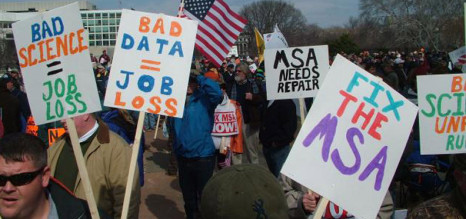
In an effort to ensure a proper balance between the biological needs of our fish stocks and the economic needs of our fishermen and coastal communities, I have introduced legislation with a number of regional cosponsors to reauthorize and strengthen the MSA. House Resolution 1335, the Strengthening Fishing Communities and Increasing Flexibility in Fisheries Management Act, provides a number of modest but necessary reforms, including efforts to: provide fisheries managers with increased flexibility and transparency; allow for improved data collection through the use of electronic monitoring; increase accountability for our federal agencies; and create predictability and certainty for coastal communities that depend on stable fishing. Read the article here
The Congressman’s article was rebutted by Stosh Anderson, a fisherman from Kodiak and former North Pacific Fishery Management Council member, who thinks MSA is only applicable to Alaska fishery management! He wrote an opinion piece in the Alaska Dispatch titled Don Young seeks to unwind ‘Alaska Model’ for fisheries in Magnuson-Stevens Act Read the article here Don Young answered back. Don Young: Stosh Anderson misrepresents Magnuson-Stevens reauthorization Read the article here
Dick Grachek commented at Fisherynation.com on Andersons article, and lays out what HR 1335, “Strengthening Fishing Communities and Increasing Flexibility in Fisheries Management Act”, does for the nation’s fishing communities.
“Under Young’s bill, annual catch limits, set to keep fish stocks healthy for the long run, would no longer be necessary for managers. Reasonable timelines put in place to replenish depleted fisheries could also be loosened or open-ended, delaying economic and recreational opportunities that come from healthy stocks.” (Stosh Anderson)
“Reasonable timelines”? How about arbitrary and baseless?
Even Jane Lubchenco, NOAA Fisheries Director admitted in a congressional hearing that there was no scientific basis for the rigid rebuilding timelines in the 2006 Reauthorization of Magnuson Act. Jane Lubchenco was one of the authors of the infamous “Oceans of Abundance” http://www.edf.org/sites/defau… (this was an eco-political leaflet and primer sponsored by and filled with NGO lobbyist talking points aimed at the signers of the 2006 reauthorization)
And “flexibility” and “transparency” as stated in the House Proposals does not mean the elimination or undermining the necessity of “catch limits based on science”.
East Coast fishing communities have been devastated by the legislated rigidity in the timelines for rebuilding historically varying fish populations, coupled with the imposition of catch shares in 2010 (in violation of the existing MSA Reauthorization Act 2006, MSA 303A (D) NEW ENGLAND AND GULF REFERENDUM and National Standard 5). This House Bill remedies some of those inequities.
The proposals for flexibility, transparency, predictability, fishermen representation, and taking into account the environmental and socio-economic aspects of fishery management in this current reauthorization bill before Congress are long overdue. And actually most of these current reauthorization proposals are simply reinforcing and making more specific several existing—but mostly ignored by management—MSA Standards relating to “setting catch limits based on science” and insuring that it’s the “best available science” through utilizing cooperative surveys and assessments from “other sources” (National Standard 2). Current proposals also reinforce the National Standards 1, 4, and 8, which account for the survival of the fishing communities. http://www.nmfs.noaa.gov/msa20…
The current House Bill proposals clearly do not reverse or “gut” any of the basic fish replenishing tenets of the Magnuson Stevens Act.
From the House Natural Resources Committee website: http://naturalresources.house….
“The draft proposal, while maintaining the key themes of the Act, would make the following improvements: – Provide flexibility for fishery managers when rebuilding depleted fisheries – Provide flexibility for fishery managers when setting annual catch levels – Provide more transparency for fishermen and others in both science and management – Provide more predictability and stability for fishermen and fishery-dependent communities – Allow fishery managers to take the economic impact of their decisions into account when setting harvest levels and developing rebuilding plans – Allow fishery managers to take environmental conditions into account when establishing harvest levels and developing rebuilding plans – Allow fishermen in regions where catch share programs have been controversial to have a say in whether a new catch share program will be implemented and to be provided better information when considering such a program – Provide a schedule for obtaining better fishery dependent and fishery independent data especially for data poor fisheries and provide greater protection for confidential information submitted to regulatory agencies – Authorize appropriations for an additional five fiscal years at current funding level”
Visit http://naturalresources.house…. to learn more. Or https://www.govtrack.us/congre…
Jessica Hathaway Editor in Chief of National Fisherman: A Five Year Failure.
Catch share programs have been heralded in all corners of the country, first by NGOs and second by some of the fleet owners, fishermen and processors to whom they have brought success.
The counterbalance to those claims of success are of course the thousands of voices of fishermen and many more thousands of supporting small businesses put out of work as a result of catch share programs. But even worse, at least one catch share program was implemented with such haste that it may actually be damaging the ecosystem it was prescribed to save.Enter: New England groundfish. In a press release yesterday, Northwest Atlantic Marine Alliance Community Organizer Brett Tolley stated, “In the five years since the catch share policy was implemented in New England, fishing rights have dramatically consolidated, community based fishermen have less access to fishing quota, and pressure on inshore fishing areas has increased.”
Flexibility in Magnuson is the only way to give some New England and Southern fisheries a whisper of hope. The fishermen in these regions need legislation to push their councils to take a holistic look at fishing communities and ecosystems. How can we refuse to offer a helping hand to fellow fishermen? Read the rest here
MSA doesn’t only affect fishermen, it affects the supporting industry infrastructure, and consolidation of the nations fishing fleet means closures of those businesses.
Industry Infrastructure – Allied fishing businesses critical to seafood industry survival
When consumers enjoy a seafood dinner caught by local boats, it isn’t just the fisherman they need to thank for the pleasure.
Dozens of family-owned allied area businesses play a vital role in the local fishing industry, supplying a wide variety of goods and services that keep fishing afloat, ranging from gear and fuel to food, fresh water and ice.
Retired fisherman James Kendall, owner of New Bedford Seafood Consulting, underscores the importance of these allied businesses to all sectors of the commercial seafood industry. Often family-owned, these operations, he notes, have been forced to become “very adaptive” to meet the changing and frequently diminishing needs of the fishing industry brought about by the reduction in fishing trips allowed by the federal government.
“The fishing industry is not only the boats of the fishermen,” she (Angela Sanfilippo) said, noting that the infrastructure on land, which includes the wharves where fishing boats dock, ship chandleries that sell supplies, repair facilities, seafood auction houses, and the truck drivers who transport fresh fish to market all play a key role in maintaining the area’s commercial fishing industry. Read the rest here
If you read this article between 4/28/2015, and 4/30/2015, the Seafood Harvesters of America, (click here) a special interest group, will be lobbying our representatives that you may have voted for, in Washington D.C. to maintain the current, broken Magnuson Stevens Act.
They are not there to fix it.
Fishosophy: Overfished or Depleted?
What’s in a name? That which we call a rose by any other name would smell as sweet.”
(William Shakespeare, Romeo and Juliet, Act II, Scene II)
Contrary to what might have been true when Shakespeare had Juliet speak those words in the 1590s, how things are called is far from meaningless today. This is particularly so due to the increasingly pervasive and influential social media driven by sound bite journalism, text messages maxing out at 255 characters and Tweets at 140. When so much of contemporary communication and contemporary thought is dependent on so few words, those words, their exact meaning and their precise use have become critically important.

Thus it was with great relief that I saw that one of the amendments to the Magnuson-Stevens Fisheries Conservation and Management Act (Magnuson Act) offered by House Natural Resources Committee Chairman Doc Hastings deals with one of the most prejudicial examples of misnaming that has penalized commercial and recreational fishermen and our fish stocks for years.
This proposed amendment and a handful of others are contained in the draft Strengthening Fishing Communities and Increasing Flexibility in Fisheries Management Act (available at http://naturalresources.house.gov/magnusonstevens/). This draft legislation addresses a number of the concerns that independent fishermen – both recreational and commercial – and the businesses that depend on them have had since the original intent of the Magnuson Act has been so severely distorted by a handful of foundations, the powerful agenda-driven ENGOs that they support and the fishing organizations that have been co-opted by them.
In subsequent blogs I will be addressing some of the other draft changes.
Currently the Magnuson Act defines any stock of fish that is not at a high enough level to produce the maximum sustainable yield (msy) as being “overfished.” This is regardless of whether it is fishing that has reduced the stock to this level, or of whether cutting back on or curtailing fishing will return that stock to a “non-overfished” condition.
This law is without question the most important piece of legislation that deals with domestic fisheries management. Not only is it important because it controls the management of virtually all of the fisheries in our federal waters; it also has an overwhelming influence on the management and the managers of the fisheries in state waters (generally within 3 miles of the coast). Considering the pervasive influence of the Magnuson Act on the management of our domestic fisheries, to suggest that it’s equating “not enough fish” to “overfished” contributes to a blame-it-all-on-fishing mindset is a monumental understatement.
Obviously this is an ongoing public relations nightmare for the domestic fishing industry (and an effective weapon for anti-fishing individuals and organizations). But more than that, the almost completely fishing-centric focus on marine resource management that it is responsible for has had an undue influence on federal fisheries policy for most of two decades.
Not enough fish? No matter what the underlying reason, it must be the fault of the fishermen because that fishery is classified as “overfished.” There’s no need to look any farther than that. What a gift to the anti-fishing activists.
At this point, and without Congressman Hastings’ much needed amendment, neither pollution, degraded habitat, oil well blow outs, overzealous application of Corexit, ocean temperature shifts, low egg/larval/fingerling survival nor any other factors count because the fishery is “overfished.” Obviously fishing must be to blame and just as obviously cutting back on fishing–making the fishermen who must be responsible for the “overfishing” pay for the environmental affronts of others–is the only way to restore the overfished stocks. Just as obviously the activists aren’t the only ones who benefit from this word play.
The tragic situation that the New England groundfish stocks, the New England groundfishermen, the New England fishing communities and a bunch of New England seafood lovers are facing is about as good (difficult as it is for me to use “good” to refer to anything having to do with the current groundfish debacle) an example of how off-target our fishing-centric understanding of “not enough fish” can be. In the groundfish fishery fishing effort has been cut back significantly and repeatedly and the stocks have yet to make a comeback.
Quite simply and accurately, Chairman Hastings’ draft legislation substitutes “depleted” for “overfished” wherever it appears throughout the Magnuson Act.
To what benefit? Most simply, this will take the management focus off fishing where overfishing isn’t a factor, encourage the consideration of other factors in determining why there aren’t enough fish in a particular stock and encourage the adoption when appropriate–when fishing isn’t to blame–of measures other than reducing fishing to return a stock to levels that will produce the maximum sustainable yield.
What’s the downside? If you’re not on a career track that depends on demonizing fishermen and/or fishing or if you aren’t responsible for any of the many other factors that negatively affect our fisheries, there isn’t one. Overfishing will be as unacceptable with this change as it is without it, but it will provide our fisheries managers while attempting to restore stocks to the MSY level the wherewithal to consider and, we should all hope, deal with other negative factors as well.
It’s going to be interesting to examine the “reasons” that the antis come up with for opposing this long overdue and entirely justified change.
Nils Stople
CLF and CLF Ventures: or we get rich by litigating the hostile takeover and trading away of public resources for corporate exploitation while claiming to save the planet.
CLF and Amendment 16 Catch Shares
Some origins of the catch shares privatization scheme: “The Cape Cod Hookers” a prototype.
The Conservation Law Foundation (CLF) and their “strategy-consulting arm” CLF Ventures apparently have become fisheries Policy Makers, Litigators, Fishing Quota Fund Administrators, and the authors of a “suite” of fishery conservation goals and the “metrics of success” of this suite of goals.
CLF and CLF Ventures engineered this catch share privatization scam right from the beginning—with the help of some Cape Cod “fishermen”. The Cape Cod Trust program was set up as a “success story”, a prototype for the implementation of the Amendment 16 catch shares program, the market-based atrocity that we have today. CLF Ventures (most deservedly) collects fees along the line “…as the strategy-consulting arm of the Conservation Law Foundation.”
It’s the “doing good while doing well” credo of “Free-Market Environmentalism, the Enviro- Capitalists” or translated: We get rich by stealing and trading public resources while claiming to save the planet.
http://www.clfventures.org/
“In 2007, CLF Ventures collaborated with the Cape Cod Commercial Hook Fishermen’s Association (CCCHFA) to design and launch the Cape Cod Fisheries Trust (CCFT). The trust’s aim is to obtain fishing licenses and other “fishing rights” from the open market and lease these permits back to local fishermen to access fishery resources off of Cape Cod. In return for a permit, fishermen are required to follow predetermined sustainable fishing guidelines.”
“CLF Ventures built a matrix of replicable grant/contribution, debt, credit enhancement, and equity options as well as an itemization of alternative structures which would optimize the Trust’s objectives for purchasing, holding, leasing, and potentially selling fishing quota. Finally, CLF/CLF Ventures staff has helped create a suite of time- phased conservation goals with initial metrics of success. These metrics would be included in leases between the Trust and community fishermen.”
“CLF Ventures develops and delivers solutions to environmental problems through market-based initiatives.” And “We help you better understand your target audience and effectively reach your stakeholders by leveraging our reputation as a trusted environmental non-profit organization.”
www.clfventures.org/ under “about us”
“CLF Ventures was founded on the principle that solving tough environmental problems requires more than enacting strong environmental laws and enforcing them; it requires harnessing market forces to bring about environmental change. CLF Ventures’ work focuses on market solutions to environmental problems that advance CLF’s mission to protect New England’s environment for the benefit of all people. Distinct from CLF, CLF Ventures does not do advocacy, policy work or litigation. CLF and CLF Ventures work in concert, using distinct but complementary approaches to achieve the best environmental outcomes.
CLF Ventures bridges the public and private sectors to advance innovative, market-based solutions that benefit the environment, society, and our clients’ bottom line. As the strategy-consulting arm of Conservation Law Foundation, one of the country’s leading environmental organizations, we provide a strong environmental reputation and solid standing with community stakeholders. By leveraging our relationships, policy acumen, reputation, and skills, we deliver insights and strategies that traditional firms cannot, and we strengthen our clients’ ability to navigate critical stakeholder issues, mitigate risks, and develop new opportunities.
“CLF Ventures was formed as a separate 501(C)3 non-profit organization to advance CLF’s mission. CLF Ventures earns revenues for its work, including fee-for-service arrangements, because it adds significant value to its clients’ projects. CLF Ventures revenues contribute to CLF’s operating budget, but do not directly fund any specific programs”.
http://www.clfventures.org/
Marine fisheries and fishing communities in the United States face a myriad of challenges: depletion of resources through over-fishing, excessive by-catch, habitat damage, as well as a rapidly increasing permit ownership consolidation among large corporations, and flawed public policies. The impacts of these problems are most severely felt by the rural coastal communities and fishing families that have for generations depended on the health of the fisheries resource. Extensive job loss, reduced wages, business closings, out-migration (defined as the transfer of the industry to another location as well as transfers of fishermen to other jobs elsewhere), and diminishing fish populations are among the most damaging and chronic effects. (Underlines are mine, see below reference)
Distinct from community-based management of fishery quotas, community ownership of quotas – held in a permit bank, fishery trust or similar vehicle – is fundamental to the success of a catch-share fishery. Communities are uniquely positioned, politically and practically, to own and distribute fisheries quota as a profitable and sustainable business operation. Communities also are best positioned to reinvest in fisheries management infrastructures, but for the local fishing businesses in those communities to thrive, they must be able to access financing to become long-term owners in the fishery.
**************************
“Extensive job loss, reduced wages, business closings, out-migration (defined as the transfer of the industry to another location as well as transfers of fishermen to other jobs elsewhere), and diminishing fish populations are among the most damaging and chronic effects.”
The above description itemizing the ills of the fishing industry, found in CLF Ventures’ rationale for establishing The Cape Cod Fisheries Trust and eventually “…to launch recruitment efforts to build a robust network of functioning permit banks”, ironically is a description which accurately describes the devastating effects of catch shares permit banks and the consequent fisheries consolidation inherent in this “innovative market-based solution” which was so expertly “advanced” by Peter Shelley’s CLF and CLF Ventures.
As predicted by many, this catch shares management scam has devastated the fishery, and as an indication of the integrity and ethics standards of this “conservation” group, CLF has recently turned on their Amendment 16 lawsuit allies and declared this fishery disaster to be NOAA’s fault for constantly “giving in” to the self-destroying fishermen and their greedy demands for more fish— especially, I suppose, as The New England Fishery Council fully represents and caters to fishermen by succumbing to the fishermen’s vast powers of influence. http://www.talkingfish.org/
CLF and Wind
Another wonderful Project CLF Ventures has “consulted” on is wind. Offshore wind farm programs also fit nicely with the idea of consolidating and controlling independent fishing operations and opening up tracks of bottom for energy exploitation by pushing Marine Protected Areas and the administering (i.e., controlling the quota) of community trusts and permit banks, and therefore, controlling fishing effort and fishermen behavior through bequeathing —or not—the ability to fish through the doling out of permits and quota.
CLF/CLF Ventures, in other words, are lobbying entities and “fund” managers employed by various investors to “grease the skids”, whether it’s for the financialization of the fisheries resource through catch shares or publishing a “guide to the issues”, or to “educate local decision makers” and help them with a “better understanding of perceived negative effects” relating to, for example, “wind projects in local communities” and nifty little economic driver money-makers like catch shares, or the ecological windfall of Marine Protected Areas . This is essentially a hostile takeover of the fisheries resource, fronting as conservation.
http://www.clfventures.org/
The Massachusetts Clean Energy Center (MassCEC), a state agency devoted to accelerating the success of clean energy development and jobs in Massachusetts, was looking to build deeper knowledge about the potential for wind projects in local communities and a better understanding of perceived negative effects. MassCEC engaged CLF Ventures to help them develop and execute a strategy that would reach local leaders who are grappling with these decisions. (Underlines are mine)
“For MassCEC, CLF Ventures developed a thorough, yet easy to understand, guide to the issues surrounding the development of wind energy, and worked with us to engage and educate local decision-makers through a series of regional forums. These have helped local stakeholders to identify objective information on which to base their decisions about wind projects.”- Andy Brydges, Massachusetts Clean Energy Center
It’s no wonder that CLF’s Peter Shelley et al, insinuated themselves into the Amendment16 lawsuit as interveners in defense of NOAA and the catch share scheme. The catch shares coup was CLF’s money making business plan from the start. How’s this for a plan to add “…significant value to its clients’ project”: Shrink , Consolidate, and Control the local fishing fleets in order to expedite clients’ exploitation of the ocean bottom for energy production: “MassCEC engaged CLF Ventures to help them develop and execute a strategy that would reach local leaders who are grappling with these decisions”. (Underlines are mine)
CLF: Who let them in?
In 1991 the Conservation Law Foundation (CLF) along with the Massachusetts Audubon Society sued the Secretary of Commerce and NMFS for failing to prevent “overfishing” and failing to “rebuild” the “depleted” stocks (none of these terms had been adequately defined —but that was OK they were gonna’ sue anyway). The responsibility for fulfilling the resulting “consent decree” ruling issued by the court —which required a definition of “overfishing” and a plan to stop it within six months (after they decided what the “it” was that they were stopping)—fell to the New England Regional Fisheries Management Council.
This of course was an impossible task. No one even knew what they were talking about, what these terms actually meant, no less, how to implement or prevent anything; but the significance of the CLF lawsuit was that it was part of a process that might not have been as ridiculous or haphazard as it appears. This appears to be a major turning point for NOAA/NMFS becoming solely an enforcement and regulatory entity more than a service to the national fisheries. These law suits in ’91 were manifestations of the not so new fisheries crisis mentality of “overfishing, overfishing, overfishing …stop the ocean-rapers! Quick Before It’s Too Late!!!” Only nowCLFandfriends had gotten this frenetic bogus approach to fisheries regulation through the judicial, and not long after, through the legislative branches of government and set themselves up as major players in fisheries management in the process.
This year 1991 was when NMFS through Amendment 4 to the Magnuson Stevens Act started to use imperative terms such as “must contain” and “must adhere” to what Congress intended to be “guidelines” in the Magnuson Fishery Conservation and Management Act. NMFS started to take CONTROL; and then pushed by the CLF lawsuit Amendment 5 in 1994 which gave us “direct effort controls” in the form of our beloved “days-at-sea” effort control program, NMFS was set up to administer and enforce these direct effort control programs. NMFS emerged from this legislative, judicial, and managerial spaghetti mess as the Authority and were well on their way to becoming the Authoritarian Agency that we know and love today. Was this just a happy accident of circumstance for an ambitious bureaucratic NMFS agency, or was this the result of a larger strategy involving the CLF and corporate funded ENGO’s? Up to this point NMFS had not the charter or the authority that they now were sliding into.
In any case, the CLF and the Commerce/NOAA/NMFS bureaucrats were clearly working in unison and so it’s no surprise that the CLF contingent continues that trend today, for instance, inserting itself into the Amendment 16 Lawsuit in defense of NOAA and Amendment 16 catch shares.
All the public sees is CLF’s and the other various ENGO’s glossy eco-presentations and their seductive pitches for contributions; so, unsuspecting people anti-up support and feel good about doing the right thing to stop overfishing and help the environment. All the while these NGO slugs are right in the forefront of fostering the privatization scams that have the world economy wheezing, a lot of people starving, and the environment disintegrating (fish included).
Also “Non-Profits” such as EDF, CLF, Natural Resources Defense Council, Center for Biological Diversity, etc. are nothing more than coveys of lawyers that set themselves up as players in the eco- litigation arena and then collect their “consultation fees” from the various players including from the government whose agencies they are suing. This is a money scam not unlike the government official-soon-to-be-lobbyist graft in DC or the terror-protection-extortion racket of organized crime.
From the House Natural Resources Committee Website, regarding inquiries into Center for Biological Diversity and taxpayer dollars:
http://naturalresources.house.
“DOJ Documents Confirm Center for Biological Diversity Received Millions in Taxpayer Funds from ESA-Related Lawsuits”
“WASHINGTON, D.C., June 27, 2012 – The Center for Biological Diversity today sent a letter to House Natural Resources Committee Chairman Doc Hastings claiming their organization had only received $553,000 in taxpayer funds resulting from Endangered Species Act (ESA) related attorney fees and court cases. This claim conflicts with data obtained from the Department of Justice (DOJ), which shows over $2 million in taxpayer dollars have been paid out to the Center for Biological Diversity and their attorneys for cases open between 2009-2012.”
“According to this document from the DOJ containing 276 pages of case information, the Center for Biological Diversity was involved in over 50 individual cases, open between 2009 and 2012, where they were the lead plaintiff. The amount of attorney fees and court costs associated with these cases is $2,286,686.91. Of this amount, $138,114.45 was in court costs and $2,148,572.46 was in attorney fees.”
Non-Profit means Non-Taxable; it does not mean Non-Money. In the case of the Center for Biological Diversity and Conservation Law Foundation, government collected taxpayer money is being paid out to these ivy-league scam artists when they turn around and sue the very same government’s agencies. They are getting rich claiming to save the planet and its seas while they put working communities on the bread lines. It’s an industry devastating con that these Eco-Frauds have brought to New England. Here they’ve managed to squash an entire fishery by pushing agenda-driven anti -fishing “science” and the resulting bogus fishery regulations while they get fat on legal fees.
End. Comments can be made here
MSA Reauth: Changes Proposed for U.S. Fisheries Management: The Good, The Bad, and The Ugly
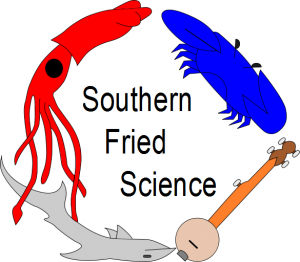 This past Tuesday, the draft bill to reauthorize the Magnuson-Stevens Act was released by the U.S. House. The Magnuson-Stevens Act is a big deal because this is the law that lays out how fisheries management works in the United States. This time, a number of changes have been proposed by Representative Doc Hastings, some of which could fundamentally change fisheries management and fisheries science in U.S. waters. The proposed changes immediately became controversial, garnering overwhelming support from witnesses to the House Natural Resources Committee hearing of the bill (witnesses included representatives from the recreational and commercial fishing industries as well as the Mid-Atlantic Fishery Management Council) while Pew Environment strongly opposed the bill, calling it the “Empty Oceans Act” (translated into GIFs by Upwell for your viewing pleasure). Read more@southernfriedscience 22:01
This past Tuesday, the draft bill to reauthorize the Magnuson-Stevens Act was released by the U.S. House. The Magnuson-Stevens Act is a big deal because this is the law that lays out how fisheries management works in the United States. This time, a number of changes have been proposed by Representative Doc Hastings, some of which could fundamentally change fisheries management and fisheries science in U.S. waters. The proposed changes immediately became controversial, garnering overwhelming support from witnesses to the House Natural Resources Committee hearing of the bill (witnesses included representatives from the recreational and commercial fishing industries as well as the Mid-Atlantic Fishery Management Council) while Pew Environment strongly opposed the bill, calling it the “Empty Oceans Act” (translated into GIFs by Upwell for your viewing pleasure). Read more@southernfriedscience 22:01
Endangered Species Act (ESA) Congressional Working Group releases final report & recommendations
 The Endangered Species Act (ESA) Congressional Working Group, led by Representatives Doc Hastings (WA-04) and Cynthia Lummis (WY-at large), today released its final Report, Findings and Recommendations. The report concludes that “After more than 40 years, sensible, targeted reforms would not only improve the eroding credibility of the Act, but would ensure it is implemented more effectively for species and people.” Read [email protected] 18:12
The Endangered Species Act (ESA) Congressional Working Group, led by Representatives Doc Hastings (WA-04) and Cynthia Lummis (WY-at large), today released its final Report, Findings and Recommendations. The report concludes that “After more than 40 years, sensible, targeted reforms would not only improve the eroding credibility of the Act, but would ensure it is implemented more effectively for species and people.” Read [email protected] 18:12
Oversight Hearing on: •”ESA Decisions by Closed-Door Settlement: Short-Changing Science, Transparency, Private Property, and State & Local Economies”
 Watch the archived video webcast – “Undoubtedly, some believe cramming hundreds of obscure species onto the ESA list under deadlines and blocking off huge swaths of land because of the settlements are ‘successes,’ but many areas of the country tell a different account of how these policies are impacting their communities, their economies, and ultimately, the species,” Doc Hastings [email protected] 09:08
Watch the archived video webcast – “Undoubtedly, some believe cramming hundreds of obscure species onto the ESA list under deadlines and blocking off huge swaths of land because of the settlements are ‘successes,’ but many areas of the country tell a different account of how these policies are impacting their communities, their economies, and ultimately, the species,” Doc Hastings [email protected] 09:08
The Art of the Rant
 |
“A real inconvenient truth”
Your snide and disingenuous remarks about US fishermen thinking the US taxpayer covering the bill for observer coverage is a nice ploy Mr. Shelly. You guys are so slick at pitting the general public against your favorite fund raising target.(commercial fishermen)
Why don’t you explain to your kool aid drinking followers how the federal Gov/NOAA/NMFS/ or whatever they call themselves today have been stealing the import duties on foreign seafood from the Saltonstall Kennedy act that are supposed to go to the industry to support and pay for things such as observers. Talk about an inconvenient truth. Or perhaps how yours and the host of other ENGO’s are funded by big oil and their minions who are looking to rid themselves of those pesky little food producers who happen to be in the way of their and your plans of ocean conquest and industrialization! Another inconvenient truth. Or how those import tariffs on foreign seafood have been stolen for years used to bolster the budget of the over regulating bureaucracy known as the Dept. of Commerce, who runs NOAA and the National Marine Fisheries Diservice. How many tens or hundreds of millions of dollars has this added up to over the years? This would be a great project for your outcome based numbers crunchers. Or how we as a nation are now importing 93% of the seafood consumed by our citizenry. God forbid we reduce our dependence on foreign fish! Fish that by the way come from nations that practice little or no conservation measures at all. My God man, do you realize what the consequences to the amount of foreign fish import duty dollars that are being stolen would be?
Christ if you let those American fishermen go to work and earn a living catching American fish and selling them to the American consumer, the stolen seafood import duty funds would perish, and the need for fishermen to get any government money woild go away! God forbid!
Wake up people you are being duped by these white collar so called conservationists. Remember, it’s got nothing to do with conservation. It’s all about control of food and money. Don’t be sheep. Follow the money trail.
“Connect the dots”, “Follow the Money” and all that…
Oceana was established in 2001 by a group of leading foundations — The Pew Charitable Trusts, Oak Foundation, Marisla Foundation (formerly Homeland Foundation), and the Rockefeller Brothers Fund.
—Pew Foundation as most people now know is the Joseph N. Pew (Sunoco Oil) fortune, with holdings in Exxon Mobil and other major oil companies.
—Oak Foundation was started by Alan M. Parker the current President of Government Group of ENERGY SOLUTIONS, INC a natural gas consulting firm.
—Marisla Foundation is the Getty Oil fortune.
—And Rockefeller? The Rockefeller Bros. Foundation: Standard Oil and Exxon Mobil should ring a bell.
————————————————————————————————–
Letter to the editor of Fishery Nation,
Fishermen In Alaska Should Be Nervous As A Dartmouth College Girl About Community Fishing Associations Acting Like The New Nice Guy In Town
Yes the new nice guy in town is the Community Fishing Association. Forget about past transgressions and the screwing those other unfortunates have gotten at the hands of this monster he has been re-branded with a squeeky clean image and an attitude that says, “I am just here to help you and pay attention to your needs.” So right about now there is a lot of free drinks, some light touching and joking around, and plenty of attention. Sadly many of us already know how this ends, but that’s okay because statistically 95% will not speak up, and of the 5% who do, only a pathetic 2% will be believed. So when you wake up crying don’t immediately blame yourselves as so many are inclined to do. Because this guy knows exactly how to take it all from you, there is a virtual playbook written by those who have done it before.
To put it bluntly, the majority of you are about to be raped. The lawyers, liars, and lobbyists headed your way are going to take you for everything you’ve got and if you’re lucky, lease it back to you for an exhorbitant price. If what happened in New England is any indication it is likely to be a screwing of biblical proportions that no amount of letters to Penthouse will ever do justice. Those of you that complain will get it the worst, and the ones who cooperate will become finger puppets used as weapons against your fellow fishermen in order to get more of what is theirs. The money shot is a large donation from the PEW Charitable Trusts financing anti-fishing campaigns that turn you against each other. Once that gets in your hair it isn’t easy to wash out.
So please be warned and take the time to really look at the Community Fishing Associations that are being presented as role models. Look past the carefully created image they have spent a fortune to fabricate. When those nice folks got extra quota awarded to them it came from the shattered hopes and dreams of so many others. When they mount media campaigns bashing other fishermen, people get hurt, and it still goes on today. One only need listen to those who represent CFA’s at fishing council hammering away on fishermen who have done nothing but try to make a living. There is no such thing as extra, when you take from others it may make you a success but it surely doesn’t make you a nice guy. There is a very good reason these folks want CFA’s in place before any more quota systems are developed. They want to be there when the wealth of ALaska’s future is divided to ensure they get a chance to take as much as possible and a legal way to buy up the rest, preventing industry consolidation by gathering it into their own hands.
Fishermen have always been an honest, (Barring fishing stories of course) and hard working group. So when all they have worked for is taken from them, the majority won’t shed any tears, but even the toughest of men, and the hardest of hearts are softened by the tears of hungry children whose hopes and prospects have been taken as well. Or even the tears of a cherished daughter who can no longer afford a good education at a safe college and is forced to go to a “Rapey” one instead.
Barnacle Bill
I got many endorsements of my recent letter on Kodiak’s besotted advisor selection and the demise of the King Crab Capital of the World. Emails rolled in and the phone rang constantly. The letter made a national website for, as one commenter noted, “sleeping with the enemy.”The Board of Fisheries recently approved my proposal to wisely shut down hard on bottom trawling in all state waters around Kodiak.It is clearly time for the borough and city managers to get behind funding a solution to getting back our crab Capital crown.
A few years ago, local officials abetted a line item of $28 million for a new Alaska Department of Fish and Game building. I’d like elected officials to ask for $2 million to undo some of the trawler damages to crab stocks; plus another $20 million for the restoration program to seriously rebuild crab fisheries.
Can you legitimately tell us that it is cheaper to build bureaucracies and
obligate the state to pensions and benefits than to start thinking in terms of greater annual tax revenues from fishing businesses?
Lu Dochtermann, FV North Point
Read more: Kodiak Daily Mirror – Line item needed to restore crab
The city of Kodiak and the borough just approved the ultimate insider – one who has long represented such huge trawl interests as the at-sea factory trawlers, who do nothing for our local economy – to be the new fisheries adviser. One wonders why Heather McCarty would even take a mere $30,000 position in a community far from where she lives.
Further, how can the wife of a major federal fishery council voting member — Dr. James Balsiger, Alaska regional administrator of the National Marine Fisheries Service — not be compromised while aboard at Kodiak?
Sure she is talented, likeable and qualified. Making a living off our federal fisheries has been her major lobbyist income for well over a decade. But that’s no excuse for letting Kodiak’s guard down.
Mel Stephens was right when he expressed serious concerns about the selection process. Louise Stutes was right when she questioned whether McCarty will be likely to represent all fishing sectors in Kodiak, because she is employed as a lobbyist for Pacific Seafoods Inc., employment she’ll drop if chosen.
Stepping down is not sufficient. Council expertise alone is not sufficient. Qualifications start with a long-term look at one’s integrity and overall ethics, in the light of money made and former clients served well.
I get along with Heather, too. But I and other longliners do not want her to represent our concerns, specifically because they run counter to the large processors and bottom trawlers who cared not for our crab and halibut.
In 2013, the midwater and bottom trawl fleet in the Bering Sea took over 7 million pounds of our halibut as bycatch dumped overboard as ‘deadloss.’
Ten years ago, the halibut fixed gear fleet quota for area 4 — Unimak Pass to Attu and the entire Bering Sea — was 15.4 million pounds. However, the trawl fleet had a halibut bycatch deadloss of 7 million pounds. Yet, in 2014, area 4 halibut quota is only 3.4 million pounds.
We now get one-fifth as much to supply USA consumers, while the trawlers keep killing twice that much, year in and year out.
Kodiak was once the King Crab Capital of the World. Congratulations to our elected officials for making us the Hard on Bottom Trawl Capital of the World. The next joint budget item ought to be a new sign at the airport, so all of America will celebrate what you have done.
Lu Dochtermann, F/V North Point
Thank you for your wise consideration, James A. Tarantino 26 Fort Square Gloucester, MA 01930
—————————————————————————————————————–
Dear Senator Warren,
I personally do not share your optimism about our individual, yet collective futures. Every day fishermen are sinking deeper into debt. Every day more fishermen are forced to come to the conclusion that they will have to sell the boat just so they can come up for air.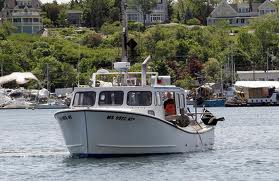
The point that seems to escape those who feel that “you guys can just go pound nails for awhile until things rebound” is that our hammer is our boat, and a boat can’t support itself in any other manner than that for which it was built – fishing.
I’ve always said that “any day that you don’t make money with your boat, you lose money with your boat”. So what the financial equation boils down to is simple – how much money do you have to lose? Because that’s the measure of how long you’ll be able to hold out. How far behind in your dockage, insurance, maintenance, mortgage, credit (debt), and emotional stability can you get before you’re forced to pull the plug, or someone else does? No Senator, we have never been confronted with a crisis of this depth before. Nor have we ever experienced such a callous, even contemptuous, attitude by those in government who are supposedly in positions of stewardship.
Do you realize who are going to be the beneficiaries of these “sustenance crumbs” which have fallen under NOAA’s banquet table will be?
The consultants, the grant writers, the lawyers who represent the consultants and grant writers, basically, the chiselers.
There is nothing here for the fisherman whose boat has set idle for months and will continue to do so until the bank repo man shows up. The fact of the matter is that the only reason why the bank hasn’t already foreclosed is that they don’t want anything to do with any “asset” that they can’t turn over at a profit, especially one which is now costing them money every day and that they have no hope of selling, because without a fishery there is no market for fishing boats!
So far The Federal Government from the bottom right on up to, and including the tippity top, have turned a blind ear and a deaf eye to our urgent predicament. Is federal relief policy in reality “too big to fail, too small to bail”?
In short, which admittedly, this response has been anything but, We need a buy-out for those who want out, and low interest debt consolidation loans combined with stabilization grants for those who want to stay in. This should be funded by SK money which NOAA along with congressional blind oversight, has been embezzling for decades We are currently in the midst of what amounts to a regulatory fishery shutdown, although no-one wants to own up to it, and desperately needed, immediate financial relief must be prioritized and fast tracked to keep us afloat until such time as we can convene a congressional inquiry into just how we got into and, more importantly, how to get out of this black hole of fisheries management.
On behalf of my colleagues, I thank you for your concern and activism on our behalf, and hope that you may view this disaster in a different light after having read this, that is, of course if you actually did!
Captain Paul Cohan, F/V Sasquatch, Gloucester, Ma.
Comment Here
————————————————————————————————
Alaska Crab Quota Owner Found Alive after 8 Years of Catch Shares and Two Days Overboard
The US Coast Guard rescued an original shareholder of Alaska king and opilio crab fishermen today, who survived for two days floating off Dutch Harbor. Sealord Ivan Fiodor Qualify, known in the fleet as “IFQ” had also won the most recent Flagstaff, Arizona amateur golf competition. He said he could not wait to get back to his armchair, collect leases, and further his addiction to watching Golf on ESPN.
Ivan had been aboard his own vessel, F/V THANKS JANE, on sea trials, and claims he fell overboard while sitting against the rail and laughing so hard that when he gagged and stood up straight, he fell backwards. The crew has been arrested on suspicion of failing to save a man overboard. But each of them claims no one saw a thing, despite Ivan the sealord saying the last thing he was telling the crew was how much Crab Ratz allowed him to “legally” charge for lease fees before paying crew for the catch, and how stupid they were for not getting original shares by going along with the privatization game 15 years ago while Ted Stevens was alive and promising them he’d give away the resource to a few people.
In their version, the crew said they were in the galley eating cake and that Ivan said he was going out on deck to take a pee. One crewman thought a whale had bumped the boat while Ivan was on deck and speculated in hindsight that it must have caused Ivan to fall over the rail. The crew was scheduled to bunk down, and it was Ivan’s turn at the helm, so no one missed him for many hours, until another crewman’s watch clock alarm went off so he could take a turn at the wheel. When they didn’t find Ivan in the wheelhouse, the crew wasn’t concerned, as that had happened many times before and Ivan was known to lock himself in his stateroom and snort lines of milk sugar – a habit he picked up as a baby when he spilled his formula mixture right after his mother weaned him.
Ivan said he stayed alive by the pure luck of finding a large black plastic buoy that was Japan tsunami flotsam, apparently used for high seas fishing, as he held onto his quota license in a passport case around his neck. He kept repeating, “I got to live, as I still have to find Jane Lubchenco and give her a big sealord recipient kiss!”
When the crew was advised by officials that he was located, and alive, they didn’t seem to care much about Ivan. One said, “Maybe next time Neptune will get him.” Another said, “He’s kind of a mean old cuss and likes to be at sea, and always complains about how lousy his home visits are, how greedy his kids are and more. I am sure they’ll be glad to have poppa back home soon.”
Maybe next time, as the catch share game ain’t over until the fat lady runs the boat and sings in her wheelhouse.
Har har
——————————————————————————————————-
Thanks Danny, The truth about Carlos Rafael hurts so had to say something!
From the Moderator
The yack coming from the waterfronts of New England is, the article written by Danny McDonald, “Carlos Rafael and His Fish Are the American Dream” has pissed off quite a few people, and who could blame ’em?
Maybe you didn’t get a chance to read it, because the other fishery websites, for some strange reason, never posted it, avoiding it like the plague.
Read the article if you haven’t already.
Carlos Rafael is talking about mosquitoes, elephant balls, and fishing, which isn’t unusual,,,,,
Rafael is currently railing against the lobbying effort of the smaller New England groundfishermen who he says are trying to put a cap on the amount of permits one individual can own.
“They are like mosquitoes on the balls of an elephant,” he says of the smaller operations in the port. “Biting, biting, biting, until finally [the government] is going to say fuck off, we got to do something.
”Sensing a significant shift in fishing rules before 2010, he horded fishing permits that would allow his boats to catch more product, spending $10 million on them. He now uses 57 permits to operate 15 full-time groundfish vessels called draggers and five part-time draggers. He operates the groundfish fleet at a loss—he estimates he’s losing a couple of million each year—but he’s still better off than the folks who only have less than a handful of permits.
“The maggots screaming on the sidelines, they’re done. They can scream all they want. Nobody can save them,” he says.
They’re screaming anyway. Smaller fishermen want federal regulators to change the rules, saying it unfairly benefits the large operations like Rafael. This pisses him off. Why should he be punished for his business acumen, he asks?
All of a sudden there’s this “in your face” information from the guy that refers to himself as “The Codfather”.
I’ll bet some people were probably even hurt reading this.
One would wonder what third, fourth generation fishermen, real fishermen, were thinking when they read that trash talk crap.
I wonder what all the Fleet diversity people think? You know, the “Who Fishes Matter’s” people?
Anyone that has lost his balls should be insulted, and that’s a lot of gelding fishermen walking around broke with nothing.
The article brings up that “us against them”, the “haves and the have not’s”. “Wall Street vs Main Street”, the “99% vs the 1%” shit.
Carlos Rafael can brag about his business acumen, but, I have to wonder, with his purchased majority stake in the ground fish industry is this the reason that a crew can bust their asses to bring in a trip of fish with a gross stock of twenty grand, and a fuel bill of sixteen grand to cover, with shit left over to share up?
Let alone money to do maintenance, or God forbid, preventative maintenance!
He told us he’s a slick, ruthless, winner take all business man.
Who knows, maybe he’s doing some of that forward selling stuff that takes the guesswork out of how much the fish will fetch, and avoiding the auction, creating a market condition of volatility for the smaller guys because his fish, and all the imported stuff have made buyers content, keeping prices low, are causing more contractions and pain that will push more out of the business, leaving him in the position to buy another permit.
When I think of the traditional New England fisherman , I think of a guy that owns a boat that is crewed by other independent self employed fishermen, and combined, they represent the ultimate free enterprise venture that has been a century’s old working model of risk taking, and profit sharing.
I haven’t spent a lot of time thinking about the multi boat fleets because when you advocate for the industry, you do it for the industry,
It is an industry that has been diverse in it’s collective make up of inshore/offshore boats, day boats, trip boats, and fleet boats, so by proxy, you advocate for a guy you wouldn’t waste your time launching a dredged from the gut, dripping loogey on.
You know the guy that has boats with secret compartments on his boats, and a robust reputation?
Rafael is a cutthroat capitalist who is perpetually at war with someone: regulators, competitors, environmentalists. He battles, forever with an eye on his profit margin.
Rafael says the groundfish industry will be completely wiped out by next year. He says that only a fifth of those currently in business will still be around by the end of 2014.
Then I start thinking about guys like Russell Sherman, who spent a lifetime busting his ass, and he’s about to unceremoniously be destroyed because of a perfect storm of circumstance from every possible direction.
I’ll let the guy that said he was made for this country finish up.
“I’m still making money.”
“Read my lips: fuck you”
—————————————————————————————————————
Fisherynation.com Editorial: The Great Atlantic Sturgeon Debacle
This Sturgeon debacle should serve as a pretty clear indication of how our fisheries “management” system works, or more to the point, how it doesn’t work.
How, by any stretch of regulation protocol, methodology, or just plain ol’ administrative integrity, can NOAA declare a species to be endangered without an assessment? Perhaps NOAA’s luminous legal department, Lois Schiffer, could give us the “legal” justification for that one— of course, as long as it’s not attorney-client privilege, or National Security classified (we certainly wouldn’t want any terrorist fishermen getting their fishy hands on that info).
What is clear about this matter is the fact that NOAA is cowed and manipulated and directed by law suit threats from the ENGOs more than by what is actually occurring in the ocean.
This is something that can be witnessed at New England Fishery Council meetings when Pew and Conservation Law Foundation lawyers arrogantly scold the council and threaten law suit consequences during the public comment period. Threats that if the council votes contrary to the wishes of Pew, EDF, CLF, Oceana, etc. there will be “consequences”. In the case of the Sturgeon law suit brought by the National Resources Defense Council, do you suppose that the then Secretary of Commerce, John Bryson, a founding member of the NRDC might have also had something to do with the endangered Sturgeon decree?
And as the ENGO World Turn’s, Oceana Inc. has filed suit against the National Marine Fisheries Service over Observer coverage!
———————————————————————————————————————–
DENIAL, DELUSION AND NMFS STILL DOESN’T KNOW ITS NAME: The third “Managing Our Nation’s Fisheries” conference was held on 6-9 May, 2013 in Washington, DC. Titled, “Advancing Sustainability,” the national event, sponsored this time by the Pacific Fishery Management Council, is in preparation for the upcoming Congressional Magnuson-Stevens Fishery Conservation & Management Act (MSA) reauthorization, a law set to expire in September of this year.
The conference included personnel from the eight regional fishery management councils, along with officials from the National Marine Fisheries Service (NMFS) and its regions, academics, fishing representatives and fishermen, and foundation and environmental organization representatives. It also attracted attention from Capitol Hill with both Senator Mark Begich (D-AK), Chair of the Senate Commerce Subcommittee on Oceans, Atmosphere, Fisheries & Coast Guard, and Representative Doc Hastings (R-WA), Chair of the House Natural Resources Committee, on hand to outline what their Committees are planning in the way of hearings on reauthorization. Rep. Hastings indicated his desire to finish MSA reauthorization this session; the past three reauthorizations have been decadal events since the Act’s passage in 1976.
This conference was regarded as an improvement over the last one, held in 2005, with a wider variety of speakers with divergent views, including “Deadliest Catch” Captain Keith Coburn (F/V Wizard). Coburn, co-keynoting the event, told participants that climate change is real, based on what he’s witnessed in the Bering Sea. This will be an interesting message for that show’s largest viewer demographic, many of whom are still “climate change deniers.”
The day prior (6 May) to the conference opening, the Pew Environmental Group held a Capitol Hill briefing on the Magnuson Act (MSA), talking about the successes achieved as a result of the 1996 and, particularly 2006, language changes to the MSA, that explicitly ordered a stop to overfishing, requiring the implementation of annual catch limits and rebuilding plans for overfished stocks, and required fishery management plans be science-based. For more, see “Despite gains, more challenges ahead for U.S. fisheries” in the 4 May Washington Post, at: www.washingtonpost.com/
Indeed, there was a great deal of chest-beating by conference organizers about how successful the MSA has been, with claims that U.S. fisheries are now the “best-managed” in the world. However, the changes made to the MSA in the past two reauthorizations were primarily the result of the efforts of the Marine Fish Conservation Network, along with groups such as Pew. The 2005 MONF conference had little bearing on the following year’s reauthorization or the biological successes in ending overfishing and rebuilding stocks achieved thus far under the Act.
Despite these biological success there is still a clamor on the Atlantic and Gulf to roll back the 2006 language to provide more “flexibility” in managing stocks. And there is increasing concern over how the stocks are being allocated, with the creation of mini-oligarchs under the individual fishing quota or catch share programs. These programs have cost jobs, siphoned off dollars from fishermen and fishing communities alike into the pockets of third party quota owners, and have or will cause a loss of access to fish stocks by many fishing communities. As an example of how little progress has been made since the last reauthorization, not one community fishing association has yet to receive any allocation of quota.
There was also a strong undercurrent of denial at the conference about addressing funding for fishery science and data collection, and other fishery needs. Poor funding — the single biggest issue facing fishery management — simply wasn’t addressed. This denial was coupled with a large dollop of delusion by those thinking better management could be achieved with less science. Climate change was acknowledged, but there was no discussion of the additional science that will be required for understanding and adapting to more frequent and radical changes in the environment resulting from global warming. Finally, there was some wishful thinking of the regional councils on display as well, such as the Pacific Council’s claimed success with its trawl groundfish “rationalization” scheme, which is still very early in implementation and still highly problematic.
And, as an example of how far our fisheries still have to go, there were all the NMFS personnel and their paraphernalia wearing “NOAA Fisheries” badges. That moniker was given back in the late Clinton or early Bush Administrations by some National Oceanic & Atmospheric Administration (NOAA) folks but has served to marginalize the importance of the nation’s fisheries ever since. True success will be measured by the restoration to full abundance of fish stocks, a rebound of the nation’s fishing communities — and NMFS’ recovery of its name. (Note a special edition of Sublegals is forthcoming giving a full report on the MONF3 conference and MSA reauthorization).
Articles taken from Fishlink Sublegals may be freely reposted or reprinted with attribution to “Fishlink Sublegals.”
————————————————————————————————
Emails? Yeah. We get emails!
Hey Bore head. No stugots if you don’t put this up!
So! (I learned that from Sam Rauch yesterday when he answered questions at the hearing).
So! A flame war has broke out between the green pampered poodles from a green mafia outfit and Bob “Boom Boom” Vannase’s Saving Seafood crew! Seems that the green poochies don’t like it when someone calls them out on the not so legit crap that they use to get the bleeding heart support buck’s.
I just read an article here at Fisherynation about a conspiracy or sumpin’ like dat, because the made guys on Boom Booms crew must’ve embarrassed ’em! Are you kiddin’ me? Fugedabout it! They should be embarrassed! Who’s that Sean kid anyway. Sound Irish to me! He writes, “It is difficult to get a man to understand something, when his salary depends on his not understanding it.” My favorite sayin’ is from my Uncle Pauly Manella, God rest his soul. He used to say. “Teach a man to fish and some creep will try ta cheat ya out of yer livelihood!
Whoa! Uncle Pauly was so frickin’ right, heh? But hey. Sellin’ used cars beat fishin’ these frickin’ days.
This cazzo di merda shoulda picked the one that says guys that live in greenhouses should never throw rock’s!
Anyway,,,, So! This all started in the last couple a days, although it’s been festerin’ for years.
Lately, though, Boom boom and his crew has been woopin’ some green ass, and these guy’s don’t like dat! The poochie brigade, led by some high paid lawyer guy from this Consternation Law outfit has been out back, diggin’ up old bones. Stayin’ true to the racing form, he brought up old news that ain’t quite true about this guy, Niles, Nils, whatever his name is, anyway, and started sayin’ he was a Capo in Bobby’s crew.
I seen this guy around for years, but had know idea he was picking up bag money from Boom Boom. But, hey. Ya never know about these inside things.
Word on the street is Nils ain’t even a made guy
All I know is dis , it’s about time someone started talkin’ the truth about the poochie pack. I hope the little ole lady’s pumpin’ out the greenbacks see these guys for what they are, because my inheritance is at stake. My mother keeps tellin me, that my success in the used car business and other entrepreneurial rackets will get me through, and I won’t need her money to survive, but the poor little animals do. I think she’s gonna leave her dough to one of these green bean tax shelter outfits! Minga!
She says that me just wastin’ it playin’ cards, and going to strip joints, and chasing the phillies around would be a sin.
Her cat Cannoli crapped out and she feels like her dough could be better used for taking care of the frickin seals.
Hey. One more thing. I really like this thing of ours! Thanks for coming up with it! I check it everyday. I hear even the Irish guy’s like it.
Thanks a lot,,, Shut up. Sal Manella Hoboken, NJ
hmm.
Catch Shares – the Experimental Drug Foundation (EDF) Prescription that you may be looking for!
Are you a Gulf of Alaska trawl fisheries permit holder who has borrowed to the hilt under government subsidized loan programs, and sick of sharing it with the crewmembers and captains who create the real capital surplus of the industry? Are you ready for ownership in an oligopolistic economic model of socialism?
Do you suffer from an inability to sleep at night because you must compete with other permit holders in a fair and competitive fishery?
Do you find yourself getting older and growing tired of hauling trawls, pots or reeling in your long line gear?
Do you have to put up with the frustrations of whales, and having to avoid the bycatch of species such as halibut and Chinook salmon?
And would you like the relief that comes from a government approved giveaway of public resources so that you can retire early from such pressures?
Then Catch Shares may be the best prescription for you! And we at Big Fish-Pharma are here to offer you total relief – at government expense, absolutely free of charge.
Warning: Catch shares may consolidate a once-free industry, cause job losses that make QS holders’ hair losses look like a bad comb-over. Wig treatments may be required. Catch shares may lead to suicide for non-recipients, and massive setbacks for once supportive fishery-dependent communities. Gifted quotas may have to be shared by interest deductions in favor of your bank. They may lead to excessive golfing which causes Arnold Palmer Foot disorder and carpal tunnel problems, as well as hip displacements, divots and consequent Turrets Syndrome (cursing at bad club swings and ball placements). Catch shares may also lead to excessive down-family sharing requests with nagging wives and daughters who want their share of the dynasty now, not in the future. Massive cash flow problems may result, as well as Bad Investor Syndrome, even though your bank and investment advisors get rich off of your awarded shares and tradable gains and losses.
If you suffer any of these reactions or warning signs, please consult the doctors at the regional fishery council. Before using Catch Shares, also consult with your life insurance agent, tax consultants, and heart specialist to see if you can endure the dosages prescribed.
If excessive guilt, feelings of deep unworthiness, and social withdrawal and loss of friends should occur, please immediately discontinue the use of Catch Share wealth quotas and consult your prescribing doctor. In the case of shortness of breath and extreme anxiety, pay a lobbyist to attend fish council meetings on your behalf and lessen your exposure to such sunlight. If an Office of Law Enforcement special agent should show up on your doorstep, refuse to cooperate and tell them to go get an attorney.
See your doctor today for a prescription of Catch Shares to make you fabulously wealthy, healthy and wise. You’ll sleep better than any captain or crew ever did!
This paid advertisement was brought to you by Dr. Jane Lubchenco and the Academy of Untrained EDF Catch Share proponents. Copies of this ad are not available in Laotian, Swahili, Spanish and Vietnamese.
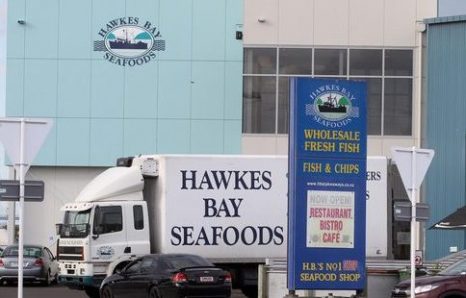
Hawke’s Bay Seafoods on trial over alleged under-reporting of catches
Dozens of fishing catch returns and other documents are alleged to have been falsified by Napier company Hawke’s Bay Seafoods, a judge has been told at the start of an expected four-month trial in the District Court at Wellington. The trial started before Judge Bill Hastings yesterday, with Ministry for Primary Industries prosecutor Stephanie Bishop saying there was deliberate and wide-reaching under-reporting of catches over about two years. Ms Bishop alleged offences were orchestrated “from the top” and the necessary skippers’ collusion was gained by cash payments and continued employment. Catches totalling up to 63 tonnes of bluenose and 3.5 tonnes of trumpeter were involved, motivated by a lack of catch entitlement and prospects of export market advantages. Charges involve mainly two types of offence, with false statements on catch-return records and selling fish not properly reported to MPI. click here to read the story 14:49
EDITORIAL – Fish Protection Rules In Jeopardy
![]() Every few years, the law is amended and reauthorized. In 1996 and 2006, it was changed to add greater protection for dwindling fish populations. Those changes might be undone in part by proposals put forth by U.S. Rep. Richard “Doc” Hastings, R-Washington, chairman of the House Natural Resources Committee. Read more here 10:12
Every few years, the law is amended and reauthorized. In 1996 and 2006, it was changed to add greater protection for dwindling fish populations. Those changes might be undone in part by proposals put forth by U.S. Rep. Richard “Doc” Hastings, R-Washington, chairman of the House Natural Resources Committee. Read more here 10:12
Center for Sustainable Fisheries
The Magnuson-Stevens Act is in Need of Congressional Attention
May 19, 2014
In a recent article titled, “The Magnuson Act: It’s a Keeper” and published in the media outlet Roll Call[1], Eric Schwaab and Bill Hogarth’s representation that the current fisheries management regime is a success and b uilt on sound science is blatantly false and amounts to no more than agency based rhetoric rather than reality. At present, there are a total of 7 Economic Disasters that have been declared by the Secretary of Commerce throughout the United States. These economic disasters are not limited to one region of the country, they span from New England, down the East Coast, into the Gulf of Mexico, and along the Pacific Coast.
uilt on sound science is blatantly false and amounts to no more than agency based rhetoric rather than reality. At present, there are a total of 7 Economic Disasters that have been declared by the Secretary of Commerce throughout the United States. These economic disasters are not limited to one region of the country, they span from New England, down the East Coast, into the Gulf of Mexico, and along the Pacific Coast.
The problem is that the writers use only a single metric of performance; whether or not a stock is overfished? But there are other metrics such as rampant underfishing and destruction of fishing communities that are measures of the success of a fishery management regime. Losses from underfishing and fishing community destruction in New England alone amount to hundreds of millions of dollars per year. The examples used are also misleading. The Red Snapper example that they cite is now in a situation where recreational fishermen in the Gulf of Mexico will be allowed to fish for only a dozen days a year. Additionally, advances in the New England scallop fishery were the result of university-industry interaction, not the management system.
Often the classification of a stock as “overfished” is due to unreliable science, not the actions of the fishing industry. In New England, the groundfish fleet is not fishing, and boats are tied up in our harbor. Yet, the industry continues to be held responsible and told it is “overfishing.” One of two things is happening here, either the government’s population estimates are wrong, or there are other factors impacting the stocks, or perhaps both. The agency has failed to look into the potential causes in sufficient detail.
Out-dated and stale scientific data, data collection methods, and analysis techniques have much to do with these economic disasters. In most regions of the country, the National Oceanic and Atmospheric Agency (“NOAA”) rarely, if ever considers information from collaborative research and scientific studies from outside sources. In New England, there has been a total failure at managing important aspects of the multi-species groundfish fishery. Due to unreliable science and the lack of transparency and collaboration, the groundfish fishery was declared an Economic Disaster in 2012. Such a failure has been admitted by the agency, yet it has not taken effective steps to rectify its failure. In point of fact, court cases are brought throughout the country on a regular basis, challenging NOAA’s “best available scientific information.”
At present, approximately 91% of the seafood consumed in the United States is imported. One can hardly classify this as a well-managed fishery that “provide[s] fresh, local seafood to consumers.”
Current fisheries policies are leading to a consolidation of the industry where large corporations and hedge funds are now buying up fishing permits and companies, moving processing plants overseas, and controlling a majority of the seafood market. The image of a fisherman going out to sea on his or her vessel with 4-5 crew members, whom all get a percentage of the catch, is a thing of the past for many areas of the Nation. No longer can a young, hardworking individual buy a vessel and put in an honest days work to help feed his or her community. Today, to enter the fishing industry an individual must have a significant amount of money available to buy permits, etc. This phenomenon is not unique to one area of the country; it has occurred and is occurring throughout the Nation.
The only partial truth told in the article is that upon the passage of the Act in 1976 the government provided “subsidies and other programs to provide access to and manage what was perceived as a near-limitless supply of fish.” The purpose of the MSA has always been to have a thriving domestic fishing industry that provides our Nation with if not all, majority of its seafood. Conservation is an important component of fisheries management, but socio-economic impacts are equally as important. Congressional intent has been overridden by bureaucratic agenda. Fisheries management has to put people and fishing communities at the forefront, not create socio-economic harm by implementing fishery management plans that ironically do not sustain the fisheries and are in fact destroying the communities.
[1] http://www.rollcall.com/news/the_magnuson_act_its_a_keeper_commentary-232805-1.html
The Center for Sustainable Fisheries is a science based non-profit organization, based out of New Bedford, Massachusetts, that is devoted to the conservation of our fisheries resources and the economic development of our fishing communities. For more information on the organization please visit www.centerforsustainablefisheries.org.
————————————————————————————
CSF STATEMENT ON EXPERIMENTAL GBYTF FISHERY
The status of groundfish stocks in New England is shrouded in considerable uncertainty. This uncertainty often raises the question as to whether stocks that are claimed to be overfished are actually overfished or vice versa. Uncertainty in this determination reflects in turn whether management regulations intended to correct these characterizations are effective. Furthermore, whether the declines in stock relate to fishing and are therefore reversible, or whether they owe to the environment and would not be responsive to changes in fishing intensity is not known. There is no doubt that a resolution of these uncertainties could yield benefits worth of the order of 100 million dollars.
It is our view that this costly uncertainty owes to an insufficiency in basic data on the abundance of stock and their life history.
It is our belief that, experimental, cooperative, adaptive fishing programs will materially contribute to the data and information pool thereby considerably reducing the uncertainties associated with current management advice.
This assertion is supported by past work on scallops and more recent studies of the gbytf. For the gbytf stock, biomass estimates obtained through mathematical virtual population analysis amounted to only 800 MT. Yet direct estimates of abundance, actually counting fish, using area swept measurements yielded estimates that had a lower bound of 4000MT. In other words, the direct measurements provided estimates of that were at least five times greater than the mathematical estimates.
Recognizing GBYTF as a opportunity for the Secretary of Commerce to demonstrate the usefulness of experimental fishing programs, and that 1) the yellowtail VPA assessment did not represent the dynamics of the stock, and 2) increased harvesting of the underfished gbytf could not only provide information, but income to an economically challenged industry, we proposed to the Secretary on January 13, an experimental fishery to achieve these goals.
We received a reply to our January 13 letter on March 26 from Assistant Administrator Sobeck denying our request.
We felt that additional information would have helped the Administrator.
Our statement today is intended to provide additional information for Administrator Sobeck and directly request the council and NMFS work with us to help put finishing touches on the details of a proposed experimental fishery which would not only provide additional data on yellowtail but on other stocks as well.
In her March 26 reply, Administrator Sobeck pointed out that although information used for management advice requires further analysis, an experimental fishery could not be approved. She said, “… an experimental fishery that would operate outside the established catch limits would result in overfishing and further strain this vulnerable stock.”
She further said that CSF concerns should be minimized because NMFS was working on a new alternative empirical approach to improve management advice. She said that the new empirical approach would, “… provide the best advice on stock abundance”.
Regarding whether the experimental fishery “would operate outside established stock limits”, this past year the commercial fishery took very roughly 100MT less than its quota (actually the ACL was 549MT and the GBYTF catch was reported as 215MT for the groundfish fleet and 164MT for the scallop fleet). Put another way, a scenario that involved an additional 100MT would not overfish (i.e. not exceed the quota), provide more than adequate sampling, begin to provide enough data for EBM, provide a better understanding of the ocean environment vis a vis yellowtail and other species, and enable new and valuable insights to the management related fishing dynamics of the fleet.
It is important to point out, as well, that such a scenario, where harvesting a magnitude of fish that is close to the quota, has an over-all benefit since the bycatch of GBYTF by the scallop fleet would be reduced substantially.
Regarding whether the “vulnerable stock” would be “strained”, it is true that the abundance of the stock is less than it was in the 1960s and 1970s. However, it needs to be pointed out that it is an assumption that that the GBYTF would increase by a factor of more than 10(back to the 60s and 70s), if all fishing on GBYTF was stopped In fact, in its present setting, the GBYTF does not seem responsive to changes in fishing intensity. If we believed this assumption, we would expect that if we stopped fishing, all stocks would increase to their historical maximum abundance at the same time.
This does not make sense. So it might not be that the GBYTF is “vulnerable” or “strained”. Maybe it is at a normal level of abundance given the current environment. Certainly the observed length-weight relationship for GBYTF did not decline from fishing, but it may have declined from a lack of food, for example, because the stock, even thought it was at a low level, was too abundant for its food resource.
Regarding whether the new empirical approach provides the best advice on stock abundance is not yet clear. Of course we have not received the final strange estimator in the sense that most statistical estimators fall inside the range of the data points whereas rho falls outside the range of data points).
Having set the stage with a reasonable approximation of the biomass, we next need to determine the reference points that tell us the proportion of the 4KMT that can be harvested.
It is important to recognize that there is not one single “golden” reference point. There are whole families of reference points. Each family stems from a different branch of theory, strange estimator in the sense that most statistical estimators fall inside the range of the data points whereas rho falls outside the range of data points).
Having set the stage with a reasonable approximation of the biomass, we next need to determine the reference points that tell us the proportion of the 4KMT that can be harvested.
It is important to recognize that there is not one single “golden” reference point. There are whole families of reference points. Each family stems from a different branch of theory, and for each branch of theory, reference points take on different magnitudes, even though they are based on identical data sets. For example reference points can be created from yield per recruit, Fx%, or production models. These will generally all give different results depending on choices made by analysts. So it is a matter of opinion as to whether the gbytf is overfished or how close the magnitude of the stock is to be overfished.
Should the Council consider only one opinion on the reference point, or does it have several that it can consider. And what criterion should be used to select a particular reference point that shows whether or not the stock is overfished? And what choices are made of parameter values to be used in the determination of reference points?
In particular, choices for M and Fx% reference points are critical. Increasing M will increase Fref. Decreasing x from say 40% to 35% will give a more favorable impression of the state of the stock. A new feature of the data presented in the empirical workshop is an acknowledgement that the value of M that has been used is set too low. The value of x that is used for gbytf is 40, but on the west coast it is 35. Does the council know the reason for this?
The report from the workshop expresses considerable uncertainty regarding gbytf movement and distribution, natural mortality, productivity, catchability absolute biomass, etc. All of this concurs with our assertion made in our January 13 letter, that relatively little is known about the gbytf for management purposes and the reason that so little is known is that there is insufficient data and that the only way to obtain a critical mass of data is through intensive sampling that can only be implemented via a cooperative program with the fishing fleet.
A key issue in establishing an experimental fishery is facilitating elimination of underfishing and harvesting a quantity of fish that is close to the quota. We expect that we will find a scenario similar to the current year. Fishermen do not want to go over the gbytf quota and be constrained from catching yellowtail and other stocks on Georges Bank. In other words possessing a high amount of gbytf quota is a ticket to other profitable catches on GB. The ticket has high value when the quota is not used up and zero value when the quota is used up. A particular case in point is that gbytf bycatch is an important constraint on haddock landings. One could further envision on a longer-term basis, that as the quota is approached, fishermen refrain from catching yellowtail because they do not know the current catch level vis a vis the quota.
Naturally budget issues arise. However in this case it is more important at the outset to discuss the desirability of the program rather than its budgetary feasibility. Discussions with industry lead us to believe at this point that they would work together with the program.
Of particular interest is that the Secretary appears to have emergency authorities to implement such a program. We believe that these authorities are enhanced by the declaration that the fishery is a disaster.
Upon declaring a fishery disaster, the Secretary has broad authority to alleviate the disaster by taking “any activity that the Secretary determines is appropriate to restore the fishery or prevent a similar failure in the future and to assist a fishing community affected by such fishery.” MSA § 312(a)(2). The MSA also authorizes the Secretary to “implement any information collection . . . program” if “the Secretary determines that additional information is necessary for developing, implementing, or monitoring a fishery management plan.” MSA § 402(a)(2).
One means to collect more information is through cooperative research and emergency regulations. “If the Secretary finds an emergency . . . exists . . ., he may promulgate emergency regulations . . . necessary to address the emergency.” MSA § 305(c)(1). Such emergency regulations “shall . . . remain in effect for not more than 180 days . . . and may be extended . . . for one additional period of 186 days.” MSA § 305(c)(3)(B). The Secretary is authorized to issue experimental fishery permits as part of its cooperative research program and in compliance with regulations promulgated with the Councils. MSA § 318(a),(d).
In New England, as you know, yellowtail stock assessments are highly disputed and ambiguous. Post stock assessment surveys completed by the New England Fisheries Science Center (“NEFSC”) and the University of Massachusetts, Dartmouth’s School of Marine and Science Technology (“SMAST”) have revealed that there is significantly greater biomass than the National Oceanic and Atmospheric Agency’s (“NOAA”) stock assessments. These surveys, completed subsequent to the issuance of the stock assessments, show that yellowtail is more abundant than indicated in NOAA’s assessments. This means that the allocations to the fishing industry are too low. With the various disputes and conflicting data, good scientific practice and the management scheme dictates that further information collection and analysis on the groundfish stocks must completed.
Further information collection is necessary to develop the allocation of yellowtail in both the groundfish and scallop fishery management plans, to ensure compliance with the MSA’s National Standards, and to alleviate an emergency situation that has the potential to result in a “similar failure in the future.” MSA § 312(a)(2). The Economic Disaster has now risen to a level of an “emergency situation” where “emergency regulations [are] necessary to address the emergency.” MSA § 305(c)(1).
For both the groundfish and scallop fisheries current management strategies run the risk of causing two potentially irreversible consequences. First, the groundfish fleet and industry will continue to diminish and disappear. And second, low allocations in the groundfish fishery lead to wasteful increases of yellowtail bycatch in the scallop fishery. Increasing bycatch is severely jeopardizing the future feasibility of the scallop industry’s ability to harvest scallops.
The Center for Sustainable Fisheries proposes that an emergency regulation be promulgated to open an experimental fishery to collect information on yellowtail stocks as a cooperative research program. Under our proposal, a reasonable and larger percentage of yellowtail will be harvested by a limited number of boats. Experimental fishing permits (“EFP”) would be issued via the experimental permit application process laid out in 50 C.F.R. 600.745. Boats holding an EFP would be allowed to fish in a normal manner under the higher allocation. As a means to provide financial support for an ailing fleet, the catch would be allowed to be sold. Selected fishing vessel owners would agree to more intensified log book coverage and port sampling.
An experimental fishery will provide several advantages, including, but not limited to, providing additional data, providing financial support for an ailing groundfish fleet, ensuring National Standard 2’s “best scientific information available,” (MSA § 301(a)(2)), requirement is satisfied. Additionally, there is the potential that the additional data and assessments will lead to increased allocations for groundfish fishermen, reduce bycatch in the scallop fishery, and alleviate the Economic Disaster in the New England groundfish fishery.
There is little risk with implementing the experimental fishery because the emergency regulation of an experimental fishery would be carefully monitored and remain in effect for merely 180 days. After the 180 days, based on the additional information collected, an improved analysis of yellowtail can be evaluated. The evaluation will determine whether allocations should remain at their current levels or be increased.
CSF is hopeful that the council will find that the experimental fishery that we have proposed to be a useful framework for the council and NOAA to develop a new and innovative approach to fisheries management that combines actual fishing with data collection and management advice. We are confidant that the technical expertise that exists in New England can flesh out this next step toward managing the ecosystem in which our multiples stock fishery resides.
Brian J. Rothschild
President and CEO
Submitted 4/24/14 at the NEFMC Council; Mystic, CT
The Center for Sustainable Fisheries (“CSF”) has filed an Amicus Brief in support of the Commonwealth of Massachusetts and the State of New Hampshire in the case brought against the Secretary of Commerce, Secretary Penny Pritzker, and NOAA. CSF is a science based non-profit organization devoted to the conservation of out fisheries resources and the economic development of our fishing communities. CSF focuses on both regional and national scientific and legal issues that arise from the current fisheries management scheme. Several fishermen, ancillary business owners, fisheries scientists, attorneys, and economists are involved in the organization and are currently working to collaboratively develop solutions to fisheries management issues.
In the case before the U.S. District Court of Massachusetts, the Attorney General’s of Massachusetts, Martha Coakley, and New Hampshire, Joseph Foster, allege that NOAA violated National Standards 1, 2, and 8 in its promulgation of Frameworks 48 and 50 to the New England Multispecies Fishery Management Plan. National Standard 1 requires NOAA to prevent overfishing and achieve optimum yield in its promulgation of Fishery Management Plans (“FMP”), including Frameworks to the plans. Under National Standard 2, NOAA is required to base a FMP on the “best scientific information available.” Lastly, National Standard 8 requires that NOAA take into account the socio-economic impacts and sustainability of the fishing communities when setting regulatory measures in the FMP.
CSF, in its brief, provided insight to the court regarding the rigorous scientific and economic analysis that the MSA requires and NOAA failed to complete. CSF discusses how NOAA’s actions lacked collaboration, timeliness, and transparency, including not seriously considering science from outside sources. To demonstrate the importance of outside science CSF discusses past examples of when NOAA’s science was not the “best available.” Examples provided include the pollock, cod, and scallop fisheries. For instance, in 1998, an independent study by the University of Massachusetts, Dartmouth SMAST on scallop biomass was dismissed by NOAA. After much public debate and national attention, the SMAST study was proven to more accurate, reliable, and the “best scientific information available.”
CSF states: “It is time to hold [NOAA] to the high standard of rigorous scientific study that Congress intended and the dedicated fishermen and their communities deserve.”
CSF also discussed the practical effects of NOAA’s failure to analyze the socio-economic data on the fishing communities’ sustainability. CSF stated: “[NOAA] did not diligently research economic impacts. The majority of the information used by [NOAA] was not original economic statistics.”
A key issue in cases involving agency actions is the level of deference a court affords the agency. Due to the agency’s expertise in matters, courts are reluctant to step in and state how an agency should interpret a statute and what regulation an agency should put in place. As a result, courts typically defer to the agency’s action as long as the action was not arbitrary and capricious, an abuse of discretion, or otherwise in violation of the law.
CSF pointed to two recent decisions that express concern with the automatic level of deference an agency is given. First, the Supreme Court has, dating back to 2008, expressed concerns with the level of deference an agency is afforded when interpreting their own regulations. The Court has primarily concerned with too much deference leading to an “arrogation of power.” CSF states: “[NOAA’s] actions substantiate concerns about the ‘arrogation of power’ that results from affording essentially unlimited deference and allowing agencies to exert excessive power.”
CSF also discussed the recently decided Guindon v. Pritzker case which involves the Gulf of Mexico Red Snapper. In the Guindon case, the D.C. Circuit Court did not defer to the agency’s decision because it “disregarded accurate and reliable data” and did not “acknowledge that its strategy . . . was not working.” CSF pointed out the similarities between the Multispecies FMP and NOAA’s failure to consider all accurate and reliable data and acknowledge that its Multispecies management strategy is not working.
CSF asked the court to recognize and hold NOAA accountable to meaningfully apply the MSA to ensure rigorous, scientific analysis and a balance between the conservation of resources and the sustainability of fishing communities.
Oral arguments in the case were heard by the U.S. District Court for the District of Massachusetts on April 4, 2014.
In addition to filing an Amicus Brief, CSF has been co-hosting Public Workshops, with National Fisherman Magazine, throughout the United States about the MSA Reauthorization. The workshops are setup to be an educational forum for participants and an information gathering session for CSF. CSF’s President and CEO, Dr. Brian J. Rothschild has proposed that the 10 National Standards be reorganized into 5 National Standards. The proposed 5 National Standards are compiled in a manner to reflect balancing among those standards that naturally overlap each other. For example, National Standards 1 (prevent overfishing), 8 (take into account socio-economic impacts), and 10 (ensure human safety at sea) are reorganized to become National Standard 1. CSF’s proposal reflects balancing between conservation, human safety, and socio-economics and also increases flexibility and reliability through collaborative and cooperative scientific research and analysis.
CSF and National Fisherman have hosted successful and well attended workshops in Seattle, Washington and Boston, Massachusetts. CSF and National Fisherman will be co-hosting its next workshop with the Gulf Seafood Institute (GSI) following the Gulf Fishery Management Council Meeting on Tuesday, April 8th, 5:30 pm at the Embassy Suites, Baton Rouge, Louisiana. The tour will continue in May in Washington D.C. and finish up with a meeting at the U.S. Capital Building with members of Congress and Congressional staffers where CSF and National Fisherman will present their findings from around the country.
For further information, contact Kate Kramer at 508-992-1170; kkramer@
CSF has posted all documents filed with the court, including the claim and briefs, at: http://
———————————————————————————————————
March 7, 2014
Dear Friend,
On behalf of the Center for Sustainable Fisheries (CSF), the National Fisherman, and the Gulf Seafood Institute (GSI) I would like to invite you to a public workshop on reauthorizing the Magnuson-Stevens Act (MSA). Please join us at the Embassy Suites, Baton Rouge (4914 Constitution Ave; Baton Rouge, LA 70808) at 5:30pm on Tuesday, April 8, 2014. Our workshop is scheduled just after the Gulf Fishery Management Council meeting on Tuesday to be convenient for those attending the council meeting. Driving directions and information on parking at the Embassy Suites are below.
As you know, the MSA is up for reauthorization this year. Several months ago there was a general feeling that the existing law would be changed very little. This would constrain fisheries-management improvements that would arise from the new language.
However things have changed. It appears that substantive changes are being contemplated by Congress.
There are at least two documents that provide rewritten language and an analysis of the changes. On November 20, 2013, I gave a keynote speech at the Pacific Marine Expo providing CSF’s rewritten National Standards that provide a conceptual backbone for the MSA. On December 18, 2013, the House Committee on Insular Affairs issued a Discussion Draft that provided modified or new language for the MSA. On January 14, 2014 CSF issued an analysis of the Discussion Draft.
The links to the papers cited above are below.
Our rewrite of the National Standards changed the current National Standard 1 from focusing on primarily preventing overfishing and secondarily obtaining optimum yield to focusing on maximizing (multispecies) yield or an economic function of yield subject to constraints on fishing mortality as determined by the fisheries management council. We see this change as strengthening the economic component of fisheries management, giving more flexibility to councils, and facilitating better “science.” At the same time our rewrite provides for institutional changes such as National Institutes for Fisheries Research and a National Fisheries Management Board that reports to Congress and provides checks and balances for the fisheries management process.
for overfished stocks. Our analysis of the Discussion Draft points to these pluses along with others. At the same time we point to the need to replace the present National Standards with wording that facilitates scientific interpretation and achieves balance among biological while holding the other National Standards in abeyance.
So there is a lot going on. What is going on is happening at various intensities around the Nation. Some believe that extensive change is necessary whereas others believe minor or no changes are necessary. This means that whatever your position, whether you are for change or not for change, it is time to put your oar in the water. The MSA Reauthorization is too important to not become involved.
This is why we think that you will share our view that it is important to convene a series of workshops around the country to discuss reauthorization and put various views on the table.
At our workshop in Baton Rouge we plan on reviewing the documents cited above. In addition to this review we plan on providing you with substantive information on the state of fisheries management and how this state of fisheries management tempers the direction of any rewrite.
Most importantly we would like to use the workshop to hear from you regarding your views so that they can be used to guide our future activities. We also hope to hear from the Gulf elected officials or their staff regarding the progress and plans for the reauthorization.
We look forward to seeing you at the workshop and discussing the MSA Reauthorization.
Best Regards,
Brian J. Rothschild CSF, President and CEO
Jessica Hathaway National Fisherman, Editor in Chief
Bob Gill Gulf Seafood Institute, Board of Directors
MSA Reauthorization Policy Paper: http://centerforsustainablefisheries.org/wp-content/uploads/MSA- Reauthorization-Policy-Paper.pdf
Congressman Hastings’s Discussion Draft: http://naturalresources.house.gov/uploadedfiles/magnusonstevensactdiscussiondraft-113.pdf
Review and Comments on the Discussion Draft: http://centerforsustainablefisheries.org/wp- content/uploads/CSF-Comments-on-Congressman-Hastings-Discussion-Draft.pdf
Directions to Embassy Suites: 4914 Constitution Avenue; Baton Rouge, LA 70808 – 225-924-6566
FROM THE WEST: Follow I-10 east to exit #158 (College Drive) on the right. At the end of the offramp, follow the signs labeled ”Constitution Avenue”, which will direct you across College Drive without turning (Constitution Avenue is the I-10 service road). Continue on Constitution Avenue for 1/4 mile, hotel is on the right.
FROM THE EAST: (I-12 West joins I-10 West in Baton Rouge): Follow I-10 West to exit #158 (College Drive) on the right. At the end of the offramp, turn left onto College Drive. Immediately past the I-10 overpass, turn left onto Constitution Avenue (Constitution Avenue is the service road to I-10). The hotel is 1/4 mile on the right.
Parking at the Embassy Suites:
The Embassy Suites offers one parking option: self-parking.
Self-parking is available for free.
Valet parking is not available.






 ,
, 
